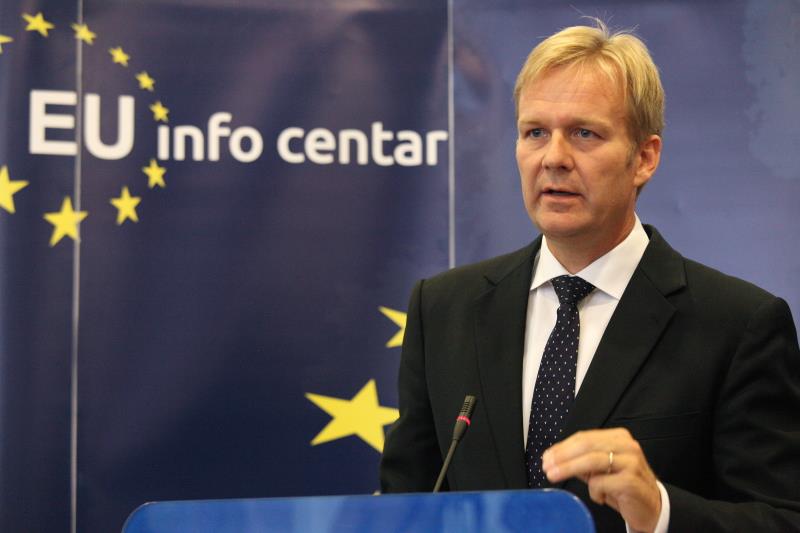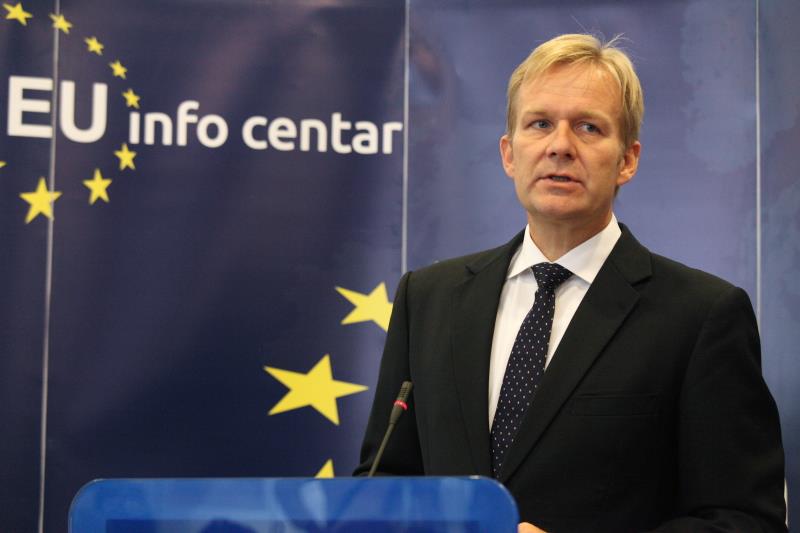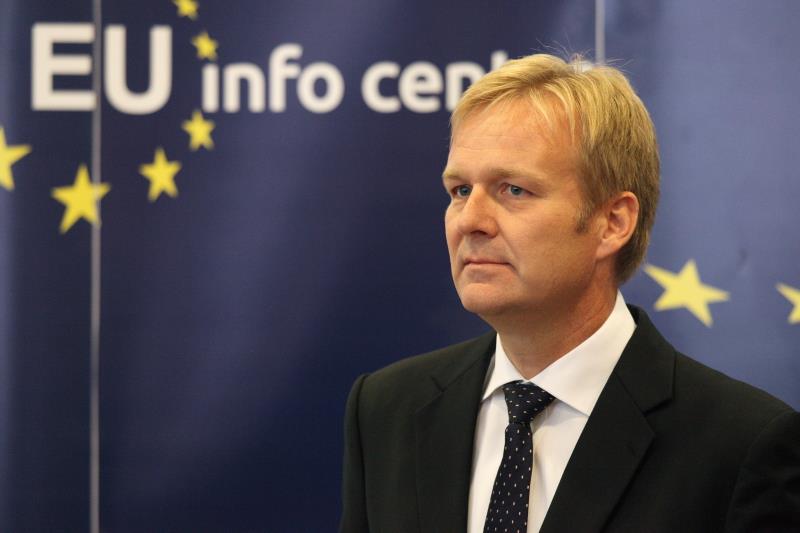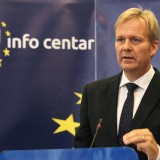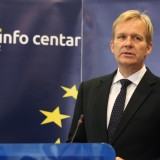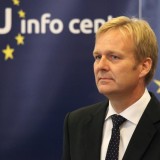Read-out of the press conference held by Head of Delegation/EU Special Representative Ambassador Peter Sorensen following presentation of the annual Progress Report for Bosnia and Herzegovina to the BiH authorities.
Ambassador Sorensen: Welcome all of you, thank you very much for coming. A number of you were already here earlier today and saw the webstreaming when Commissioner Fule was giving the presentation of the Enlargement Package. So, a number of questions and a number of comments that I otherwise would have made, they have already been said so I encourage you if you haven’t seen it to go to the web site to see this.
The European Commission has made Progress Reports on Bosnia and Herzegovina since 2005 and that gives us around 10 reports of which I have participated in handing over four of them. It is clear that this report that I have just handed over to the Chairman of the Council of Ministers, Mr Bevanda, carries no surprises, unfortunately. There are some positives but they are minor, I have to admit. But there are positives if you read the report, which I have done, twice. Late last night I got am advance copy and this morning I read it just like everyone else. When you go through it, you will see there are some positive developments but they are small because the overall picture is a picture of Bosnia and Herzegovina having a number of challenges ahead of it.
The report is done every year, it is done on the basis of input from a lot of sources, from civil society to Member-States to administrative sources and, unfortunately, the Report this year does not have an input from Bosnia and Herzegovina itself, because there could not be an agreement on what the input should be. That in itself shows you the core of the trouble that is highlighted in this report. Namely, the country’s inability to agree on prioritizing, on priorities and policies. Coordination is the weakness of the structure of Bosnia and Herzegovina and is exemplified by the fact that on the Progress Report there was not even a response from here.
There are three sections of the Report. It’s built up, it follows the Copenhagen criteria with the political criteria, with the economic criteria and the third chapter is on the acquis.
The positive things you will find in the report you predominantly find in the acquis – it’s not that people here, or we the EU haven’t worked, we’ve all been working very hard, and there have been some small success stories. But the overall picture exemplified by the political criteria, on the economic criteria, shows exactly what I’ve outlined before, namely that coordination is the challenge. The political criteria, you know the issues, they are out there, it is BiH’s inability or unwillingness, at the moment, to fulfil international obligations, that it has taken upon itself, predominantly in the context of being a member of Council of Europe, the context of implementing rulings from the European Court of Human Rights. There are several court cases; I will not mention any one by name. It is the issue of good governance; it is the issue that you have significant parts of the country like Mostar not being governed in accordance with good governance rules. People not having a chance to go and vote like they should and there are other issues being mentioned as well in the political criteria.
In the economic criteria it is very clear that regarding the focus that we also had last year in the Progress Report – namely the economic governance of the country – whereas there are some positive issues such as the Fiscal Council functioning, delivering the budgets the way they should be done. There are other issues when you start looking at the EU integration process that become of concern. Let me remind you that this is not just empty talk. 75 % of BiH’s export goes to European Union. 60 % comes from us. We are the main partner for BiH. This is the market. You need to make sure that your market is compatible with ours and when you go through the Report, you clearly see the outline of some of those challenges with that. Of course, there is the issue about having new member such as Croatia having joined. You need to adapt yourself such that you are responding to this new fact. You have not done so, and that needs to be done. There are some specific measures mentioned in the Report which I encourage you to read, if you have not done that already.
And then there are the challenges with regards to creating one market. We are inviting BiH as one country, which means we invite you as one market. The areas in which you right now you do not have one market, that needs to be changed and these are the challenges that are mentioned in the economic chapter. But more importantly, and as also you saw as exemplified by the protests, the protests that came out of here in February this year, there are some social economic realities on which BiH needs to focus. Given those social economic realities, we took it upon ourselves to assist all we could, we gathered all the civil society, experts, governing structures that wanted to participate and as you know before the summer we presented the Compact for Growth and Jobs – we believe it would be of assistance to BiH. Because it is very clear, in economic terms, your country has a challenge in the coming years to handle the pressures, not only of membership, but also of a debt burden that sits on your country. You can only respond to that if you get an investments and you start creating jobs for people. That is why we did the Compact. That is why we all the time revert to questions about job creation, job creation, job creation. Because we need to see the country generate that. Because we want to see the country move forward. I encourage you, if you haven’t, to read that part of the Report. It is very important.
Read the Compact for Growth, it is very important. And it also is the case that, as you heard, both the Commissioner have mentioned today, but also the High Representative/Vice President designate mentioned during her hearing the other day, the Compact for growth and jobs in Bosnia and Herzegovina is an agenda point for the new government that comes into office, after these elections on Sunday. They will need to face and focus on it, there is no doubt about that.
These were my remarks about the Progress report, and this will be the last one I hand in. I will only speak about the Progress Report, this is not a farewell speech, but I will say it has been a pleasure working with these things. I, like the outgoing government, I’m the outgoing Special Representative, and I leave behind a huge work to whomever who comes after me, but the agenda is clear. It’s jobs, it’s jobs and it’s jobs and that is what is shown in this report today.
This report today also shows that we are here as partners, and we want to work with whomever is in power in BiH. The report when you read it is negative, but the positive to take away from here is that we are here for the long haul, whether there a is a negative report or not, our work plan is there out for us, and we hope to have someone on the other side of that work plan that is ready to pick up that plan and baton and actually do what needs to be done in this country. These citizens here deserve better, thank you very much.
Questions from media
TV1: Ambassador Sorensen, you named all negative things in this report, could you name positive things in this report if there are any?
Ambassador Sorensen: They are all in the context of the acquis implementation, it’s getting the various bodies established, it was the anti-corruption agency, it was the census… that was the one, even before I arrived everyone told me that it couldn’t be done, and BIH actually did it. There is a number of small things, but unfortunately it is not enough to establish an anti-corruption agency, you have to staff it, fund it and then start working with it as well. So whereas the first sentence is positive we then have the work programme laid out for us in there, but if you want to find those positives, it is in the third part of the report they are to be found.
FTV: If you would need to name this report with only one word which word would it be?
Ambassador Sorensen: Stalemate. Disappointing. And I tell you why, my oldest boy asked me this morning:” Daddy what is it that you’re reading” and I explained him what it was, I had to use the internet of course to explain him, so I took BBC’s website and I typed ‘enlargement’ and if you go in and then look at the map I mean that tells you everything .Try to look at it, there are two colours, and Bosnia is one with the least colour. That tells you everything. This place deserves better. You have 28 member states who want you to be a member; you have all the things you need to be a full-fledged member like everyone else in the region.
You have an offer of “come and join us”, you have all the money needed to actually get you there, you have the experts willing to come and help you. The only thing that keeps you from doing it is not outside of Bosnia and Herzegovina. It’s yourself. That is disappointing. You cannot blame us for not moving. It is not that we have put up barriers which are too high. We have not lowered them, we help you to find ways to get over them. That is the word, if you ask me in one word, that is what it would be. You can do much better. I know you can.
BNTV: You said there was no joint reply from BiH authorities to this report, but there were comments coming from individual politicians. They range from saying that you are personally responsible, as the Special Representative, for the fact that there was no progress of Bosnia and Herzegovina; that you are saving money for after elections to give as support to flooded areas; up to some military troops you keep ready. What is your response to them?
Ambassador Sorensen: I have not seen those comments. It is very clear that the Progress Report is not a matter of any individual. I am ready to take the heat if the heat sits with me. Let’s take the floods. When it comes to the floods money, the money that really has come to the ground is the European Union’s money. They were the first ones out there and they are out there in numbers that really make a difference. We have reconstructed 90 schools. We are aiming at reconstructing 4.000 houses, 200 key facilities right now, we are helping with establishing 2.000 jobs in sectors that matter, 100 bridges and roads. We have made funds available, once we have a strategy from the whole country on how to deal with the river management, that gives us well over 10% of all the money that was pledged. That is what we have been doing. It is very, very clear that the EU has done what it needs to do.
When it comes to the issue of IPA funds, first of all – as almighty as the EUSR is, it is not that almighty. These are decisions that are made in Brussels, how money is being spent. We went into great length to explain how that money was diverted away from here, when it was diverted away. It was a decision by the Commission, supported by the Member States. The issue there was very clear, it was the same issue that was in this report, namely, the inability to coordinate the message to us what you want to use the money for. And once you have coordinated the message to us on what you want to use the money for, that you actually carry it out. Because one thing is, when we get agreement from you that you will spend money on this, the moment we come with money you disagree on what was agreed. It is to avoid that situation that we have been pushing for this issue of coordination. Very, very important. I think these are the comments that are worthwhile at this point in time. The rest is election rhetoric, which I am not going to go into. I am not participating in the election, nor am I having any stake in who gets elected.
Al Jazeera Balkans: Good afternoon my name is Stefan Goranovic and I am from Al Jazeera Balkans, could you please tell me are there any significant differences between the current Progress Report and previous ones and can you name them.
Ambassador Sorensen: No! That is yes I can say there are no significance differences! Since so far there has been no progress in a number of areas on the overall political and economic criteria, that remains more or less the same at the same exact spot. Where you will see the difference in the text is down to some of the acquis-related areas in section three, which is down to specific issues and there you will have to sit and compare them again. But there is on the overall picture no big difference from what it was last year to this year. The offer of EU membership is there, all 28 states stand behind it, we have some things that Bosnia and Herzegovina needs to do, we are waiting for this things to be done, we stand ready to assist whenever there is readiness to move on this, the lack of political will is what is keeping the country in the back.
Sarajevo Canton TV: In all four, as you said so far reports, that I had opportunity to see, I never noticed that you pointing fingers at the politicians and politics that are those blocking of the progress. Correct me if I am wrong and in this last report too there is no direct finger pointing on anyone. Can you point the finger?
Ambassador Sorensen: The Report that is written, the Progress Report that is written for Bosnia and Herzegovina, is written in the exact same manner in all countries that are included in the Enlargement process and what we trying to do there is for the Commission to take snapshot of where are the challenges that are to be overcome. This is not a name and shame exercise, that would make it very easy for the political pin-pong internally. This is EU together with the various countries. We are not in the process of naming and shaming the individuals. We are in the process of looking at what structurally needs to change for the country to change and those things are in there. It is very clear if you understand the politics of the country then, where some of the challenges are vis-a-vis which party supports what. This is not what we are aiming at here. What we aim to do is to make a very, very clear Report, that whoever comes in power can take and start and look at page one and start working, chipping off the trouble and the problems there are and in that the manner it becomes sort of a work manual rather than a political manifesto. Because that is not what we aim to here. We are not the part of the internal political management of this country. What we aim to do is to manage a Enlargement process in which the country, with whatever shape and form it comes in, as long as it is democratic and living up to our values, can be. But this country needs to act together with us and our institution and for that we need this report and that’s what is it for.
Thank you very much for coming.

